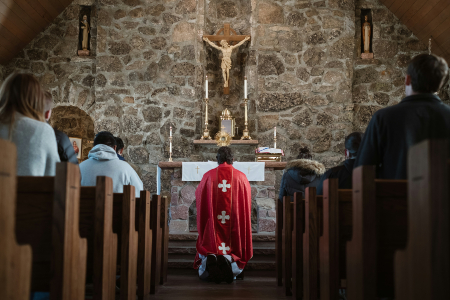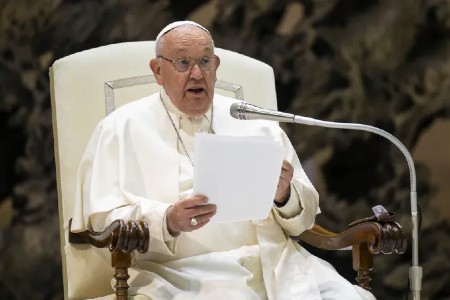We ask you, humbly: don't scroll away.
Hi readers, it seems you use Catholic Online a lot; that's great! It's a little awkward to ask, but we need your help. If you have already donated, we sincerely thank you. We're not salespeople, but we depend on donations averaging $14.76 and fewer than 1% of readers give. If you donate just $5.00, the price of your coffee, Catholic Online School could keep thriving. Thank you.Help Now >
Gaudete Sunday
FREE Catholic Classes
The third Sunday of Advent, so called from the first word of the Introit at Mass ( Gaudete , i.e. Rejoice). The season of Advent originated as a fast of forty days in preparation for Christmas, commencing on the day after the feast of St. Martin (12 November), whence it was often called "St. Martin's Lent"-- a name by which it was known as early as the fifth century. The introduction of the Advent fast cannot be placed much earlier, because there is no evidence of Christmas being kept on 25 December before the end of the fourth century (Duchesne, "Origines du culte chrétien", Paris, 1889), and the preparation for the feast could not have been of earlier date than the feast itself. In the ninth century, the duration of Advent was reduced to four weeks, the first allusion to the shortened season being in a letter of St. Nicholas I (858-867) to the Bulgarians, and by the twelfth century the fast had been replaced by simple abstinence. St. Gregory the Great was the first to draw up an Office for the Advent season, and the Gregorian Sacramentary is the earliest to provide Masses for the Sundays of Advent. In both Office and Mass provision is made for five Sundays, but by the tenth century four was the usual number, though some churches of France observed five as late as the thirteenth century. Notwithstanding all these modifications, however, Advent still preserved most of the characteristics of a penitential seasons which made it a kind of counterpart to Lent, the middle (or third) Sunday corresponding with Laetare or Mid-Lent Sunday. On it, as on Laetare Sunday, the organ and flowers, forbidden during the rest of the season, were, permitted to be used; rose-coloured vestments were allowed instead of purple (or black, as formerly); the decon and subdeacon reassumed the dalmatic and tunicle at the chief Mass, and cardinals wore rose-colour instead of purple. All these distinguishing marks have continued in use, and are the present discipline of the Latin Church. Gaudete Sunday, therefore, makes a breaker like Laetare Sunday , about midway through a season which is otherwise of a penitential character, and signifies the nearness of the Lord's coming. Of the "stations" kept in Rome the four Sundays of Advent, that at the Vatican basilica is assigned to Gaudete, as being the most important and imposing of the four. In both Office and Mass throughout Advent continual reference is made to our Lord's second coming, and this is emphasized on the third Sunday by the additional signs of gladness permitted on that day. Gaudete Sunday is further marked by a new Invitatory, the Church no longer inviting the faithful to adore merely "The Lord who is to come", but calling upon them to worship and hail with joy "The Lord who is now nigh and close at hand". The Nocturn lessons from the Prophecy of Isaias describe the Lord's coming and the blessings that will result from it, and the antiphons at Vespers re-echo the prophetic promises. The joy of expectation is emphasized by the constant Alleluias, which occur in both Office and Mass throughout the entire season. In the Mass, the Introit "Gaudete in Domino semper" strikes the same note, and gives its name to the day. The Epistle again incites us to rejoicing, and bids us prepare to meet the coming Saviour with prayers and supplication and thanksgiving, whilst the Gospel, the words of St. John Baptist, warns us that the Lamb of God is even now in our midst, though we appear to know Him not. The spirit of the Office and Liturgy all through Advent is one of expectation and preparation for the Christmas feast as well as for the second coming of Christ, and the penitential exercises suitable to that spirit are thus on Gaudete Sunday suspended, as were, for a while in order to symbolize that joy and gladness in the Promised Redemption which should never be absent from the heart of the faithful.
We ask you, humbly: don't scroll away.
Hi readers, it seems you use Catholic Online a lot; that's great! It's a little awkward to ask, but we need your help. If you have already donated, we sincerely thank you. We're not salespeople, but we depend on donations averaging $14.76 and fewer than 1% of readers give. If you donate just $5.00, the price of your coffee, Catholic Online School could keep thriving. Thank you.Help Now >
We ask you, humbly: don't scroll away.
Hi readers, it seems you use Catholic Online a lot; that's great! It's a little awkward to ask, but we need your help. If you have already donated, we sincerely thank you. We're not salespeople, but we depend on donations averaging $14.76 and fewer than 1% of readers give. If you donate just $5.00, the price of your coffee, Catholic Online School could keep thriving. Thank you.Help Now >
Join the Movement
When you sign up below, you don't just join an email list - you're joining an entire movement for Free world class Catholic education.
-

-
Mysteries of the Rosary
-
St. Faustina Kowalska
-
Litany of the Blessed Virgin Mary
-
Saint of the Day for Wednesday, Oct 4th, 2023
-
Popular Saints
-
St. Francis of Assisi
-
Bible
-
Female / Women Saints
-
7 Morning Prayers you need to get your day started with God
-
Litany of the Blessed Virgin Mary
U.S. Catholic Parishes Experience Resurgence of Traditional Practices
-

Pope Francis Urges Faith and Prayers for Peace
-

Florida Welcomes Volunteer Chaplains to Public Schools
-
10 Fascinating Details About St. Joseph the Worker: Celebrating His Feast Day - May 1
-
St. Joseph the Worker: Model for Men, Young and Old
Daily Catholic
 Daily Readings for Thursday, May 02, 2024
Daily Readings for Thursday, May 02, 2024 St. Athanasius: Saint of the Day for Thursday, May 02, 2024
St. Athanasius: Saint of the Day for Thursday, May 02, 2024 The Our Father: Prayer of the Day for Thursday, May 02, 2024
The Our Father: Prayer of the Day for Thursday, May 02, 2024- Daily Readings for Wednesday, May 01, 2024
- St. Marculf: Saint of the Day for Wednesday, May 01, 2024
- To Saint Peregrine: Prayer of the Day for Wednesday, May 01, 2024
![]()
Copyright 2024 Catholic Online. All materials contained on this site, whether written, audible or visual are the exclusive property of Catholic Online and are protected under U.S. and International copyright laws, © Copyright 2024 Catholic Online. Any unauthorized use, without prior written consent of Catholic Online is strictly forbidden and prohibited.
Catholic Online is a Project of Your Catholic Voice Foundation, a Not-for-Profit Corporation. Your Catholic Voice Foundation has been granted a recognition of tax exemption under Section 501(c)(3) of the Internal Revenue Code. Federal Tax Identification Number: 81-0596847. Your gift is tax-deductible as allowed by law.







 Daily Readings for Thursday, May 02, 2024
Daily Readings for Thursday, May 02, 2024 St. Athanasius: Saint of the Day for Thursday, May 02, 2024
St. Athanasius: Saint of the Day for Thursday, May 02, 2024 The Our Father: Prayer of the Day for Thursday, May 02, 2024
The Our Father: Prayer of the Day for Thursday, May 02, 2024


